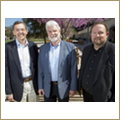 |
View this newsletter in your browser. |
 |
| Research Highlights | |
| People Spotlights | |
| Program Updates | |
| In the News |
| Calendar of Upcoming Events | |
| April 13-18 |
Climate Week |
| Weeklong series of events aimed at understanding climate risks and opportunities for business and to give Stanford Graduate School of Business students a chance to take action » Read more ... |
|
| April 17 |
Panel Discussion |
| "From the Gulf to the Arctic: What Have We Learned Since the Deepwater Horizon Spill?" Panelists include Center for Ocean Solutions Visiting Fellow Beth Kerrtula, a former Alaska state lawmaker » Read more ... |
|
| April 17 |
Environmental Forum |
| "Law of the River: The Future of Interstate Compacts in the American West" Panel discussion featuring Buzz Thompson (Law), Stanford Woods Institute co-director; David Hayes, Stanford visiting professor and former deputy secretary of the U.S. Department of the Interior; and Burke Griggs, Stanford visiting professor and assistant attorney general of Kansas » Read more ... |
|
| April 18 |
Symposium |
| "Connecting the Dots: 'Our Changing Climate'" Discussion by Stanford researchers about interconnections and interactions among humanity's need for and use of energy, food, water, climate and the environment » Read more/RSVP ... |
|
| April 21 |
Energy Seminar |
| "The Diquis Hydroelectric Project: Social, Economic and Environmental Impacts (Latin America mini-series 1 of 4)" Dr. Alvaro Umaña, Senior Research Fellow, Tropical Agricultural Research and Higher Education Center, Costa Rica » Read more ... |
|
| April 22 |
Stephen H. Schneider Memorial Lecture |
| "The Private Sector as Public Servant" Lisa Jackson, vice president of environmental initiatives at Apple and former administrator of the U.S. Environmental Protection Agency » Read more ... |
|
| April 29 |
Lecture |
| "Green Infrastructure, Groundwater and the Sustainable City Patterns" Lawrence Band, Voit Gilmore Distinguished Professor of Geography and director of Institute for the Environment, University of North Carolina » Read more ... |
|
| April 29 |
Lecture |
| "Has the Food Price Bubble Burst?" Johan Swinnen, professor of development economics and director of LICOS Center for Institutions and Economic Performance, University of Leuven in Belgium; and Thomas Hertel, distinguished professor of agricultural economics, Purdue University » Read more ... |
|
| May 1 |
Environmental Forum |
| "Climate, Technology, and the Evolution of Political and Economic Institutions" Stephen Haber, Peter and Helen Bing Senior Fellow at the Hoover Institution and A.A. and Jeanne Welch Milligan Professor in the School of Humanities and Sciences at Stanford » Read more ... |
|
| May 1 |
Closing Arguments for Montana v. North Dakota and Wyoming |
| Stanford Woods Institute Co-Director Buzz Thompson (Law) adjudicates U.S. Supreme Court case on Stanford campus » Read more ... |
|
| May 8 |
Environmental Forum |
| "The Power (and Peril) of Place-Based Ecology: Insights Into the Ground Rules for Tropical
Forests From 15 Years of Work on Costa Rica's Osa Peninsula" Alan Townsend, associate professor of ecology and evolutionary biology at the Institute of Arctic and Alpine Research, University of Colorado, Boulder » Read more ... |
|
| May 10 |
TEDx Stanford |
| Independently organized TED event featuring talks by Stanford Woods Institute Senior Fellows Steve Palumbi and Noah Diffenbaugh » Read more ... |
|
A More Resilient WorldClimate change is a challenge of managing risks. Doing that effectively through adaptation and mitigation doesn't always require major costs or effort, and often has co-benefits. For example, managing the risks of increased flooding by building more permeable surfaces can lead to other benefits such as more groundwater recharge. This theme is at the core of a recently released United Nations report overseen by Stanford Woods Institute Senior Fellow Chris Field that includes major contributions from three other Woods senior fellows. The timing of the U.N. report could not be better: Two new federal reports warn that climate change threatens aging U.S. infrastructure and increases the potential for global conflict. To meet these challenges, President Obama's budget plan includes funds for a climate action plan and a climate resiliency fund. Last month the White House also launched the Climate Data Initiative with help from Silicon Valley and Stanford. Read on for more about Woods researchers' work to connect cutting-edge research to climate action. Sincerely, |
||
Debbie Drake Dunne |
Jeffrey R. Koseff |
Barton H. Thompson, Jr. |

A New Way to See Saltwater IntrusionCalifornia coastal communities have long been dependent on groundwater to satisfy their drinking and farming water needs. But the amount of pumping is drawing seawater into coastal aquifers and corrupting water supplies. Senior Fellow (by courtesy) Rosemary Knight and her team are testing a new technique, electrical resistivity tomography, to map where underground pockets of freshwater and saltwater meet along the coast of Monterey Bay. |
||

Unintended Consequences: A Global Map of Fisheries BycatchOther than an affinity for open water, seabirds, sea turtles and marine mammals such as dolphins may not appear to have much in common. The sad truth is that they are all unintended victims - bycatch - of intensive global fishing. In fact, accidental entanglement in fishing gear is the single biggest threat to some species in these groups. A new analysis co-authored by Senior Fellow Larry Crowder provides an unprecedented global map of bycatch, starkly illustrating the scope of the problem and the need to expand existing conservation efforts in certain areas. |
||

A Surplus of Reliable Clean EnergyThe worldwide demand for solar and wind power continues to skyrocket. At issue is whether renewable energy supplies produce enough energy to fuel both their own growth and the growth of the storage necessary to deliver clean energy on demand when sunlight and wind are in short supply. For the wind industry, the answer appears to be yes, according to research by a team of Stanford scientists including Sally Benson, a Woods-affiliated professor of energy resources engineering and director of the Global Climate and Energy Project (GCEP) at Stanford. |
||

As Temperatures Rise, Crop Yields Will Likely FallIf global temperatures continue to rise, the amount of crops farmers can harvest will sharply decline during the next 100 years, according to a new study co-authored by Senior Fellow and Center on Food Security and the Environment Associate Director David Lobell (Earth Sciences, FSI). Among the findings by Lobell and an international team of climate scientists: If average global temperatures rise by more than 2 degrees Celsius, farmers are likely to harvest less wheat, rice and maize from each plot of land. |
||
| For more research, see the Stanford Woods Institute quarterly Research Digest. | ||

Behind the Scenes of an International Climate ReportIt took nearly five years, spanned time zones and languages, and required patient international diplomacy, dogged organizational discipline and a few napkin doodles. Marathon debates conducted over Skype crashed the service more than once. This is the story of how 310 scientists, including four Woods senior fellows, produced a 2,000-page report as part of a massive, three-part United Nations assessment of the current state and fate of the world's climate. |
||

Free Microscopes for Citizen ScientistsWoods Institute-affiliated bioengineer Manu Prakash is giving away 10,000 build- your-own paper microscope kits to citizen scientists with the most inspiring ideas for things to do with this new invention. The invention, called Foldscope, is a print-and-fold optical microscope that can be assembled from a flat sheet of paper. Although its parts cost less than a dollar, it can magnify objects over 2,000 times and is small enough to fit in a pocket. |
||

Perry McCarty HonoredThe Association of Environmental Engineering and Science Professors (AEESP) recently renamed an annual award in honor of Perry McCarty, the Silas H. Palmer Professor of Civil Engineering, Emeritus, and a longtime Woods affiliate. The newly named Perry L. McCarty/ Founders Award will go to a professor with a record of excellence in environmental engineering education, research and practice. In renaming the award, AEESP noted that McCarty "has transformed nearly every aspect of environmental biotechnology, and his work will continue to influence the research and teaching of AEESP members for generations to come." |
||

A White House Initiative to Share Climate DataThe White House recently launched its Climate Data Initiative, an effort to provide information to the public and local leaders to help them better prepare for the effects of climate change. The initial focus is on coastal communities and rising sea levels but will expand to include other regions and threats. As part of ongoing efforts to connect Stanford research with regional climate change adaptation, Woods has been in discussions with the White House Council on Environmental Quality about developing tools to support the initiative. Woods Executive Director Debbie Drake Dunne was invited to participate in the launch. "It was exciting to see the corporate engagement on this issue," Dunne said, noting the presence of tech sector representatives from companies such as Google that are helping with the rollout. |
||

At Stanford, Wastewater Won't Be WastedThe William and Cloy Codiga Resource Recovery Center, set to begin construction on campus this spring, will test innovative technologies for the recovery of clean water, energy and valuable materials from wastewater. Senior Fellows Craig Criddle and Richard Luthy, professors of civil and environmental engineering, have been instrumental to the project. Both have received funding for related research through the Environmental Venture Projects program and have built support for the project at Woods-sponsored Uncommon Dialogues. |
||

Capital Crash Course for Future Environmental LeadersSebastien Tilmans grew up a few miles from Capitol Hill, but the halls of power were largely a mystery to him. That was before the civil and environmental engineering graduate student experienced the Rising Environmental Leaders Program (RELP), an innovative, yearlong interdisciplinary initiative that helps participants maximize the impact of their research through firsthand knowledge of how to fund academic work, build networks, inform policymakers and communicate science research to nonscientists. A key component of the program is the D.C. Boot Camp, an intensive week that introduces participants to government professionals, including Stanford alumni. |
||

Fueling Environmental AmbitionsThe Stanford Woods Institute recently awarded grants to Stanford student projects that hold the promise of better integrating tourism with conservation and cultural protection, and bringing sustainable, small-scale clean power to developing countries, among other bold objectives. The Mel Lane Student Grants Program provides $500 to $3,000 per project for student-driven-and-managed environmental initiatives that make a measurable impact on an issue through action or applied research. The next proposal submission deadline will be in fall 2014. |
||
| Selected media coverage of the Stanford Woods Institute and its fellows, affiliated scholars and supported research |
||
Can Coal Ever Be Clean?National Geographic, April 1 |
||
Panel's Warning on Climate Risk: Worst Is Yet to ComeThe New York Times, March 31 |
||
Climate Report Warns of 'Severe' and 'Irreversible Impacts' NPR, March 31 |
||
Why the Exxon Valdez Spill Was a Eureka Moment for Science NPR, March 24 |
||
From Night Vision to Heaters, 3 of the Ocean's Most Remarkable EyesNational Geographic, March 14 |
||
Harlem Building Collapse Highlights America's Dangerously Old Gas InfrastructureTime, March 12 |
||
How Talking About Climate Change Might Actually Help Democrats Win ElectionsThe
Washington Post, March 11 |
||
Stanford Researcher Turns Wastewater Into Energy That Can Power Treatment PlantsCBS, March 10 |
||
| Find Us on the Web |
Read more News and Media Coverage from the Stanford Woods Institute's fellows and affiliated faculty, including fellows with our Leopold Leadership Program. Subscribe to our other online publications. Submissions Past issues can be found online. For more information about the Stanford Woods Institute, visit our website or email us at environment@stanford.edu. |